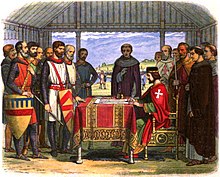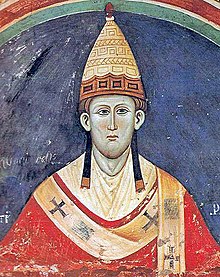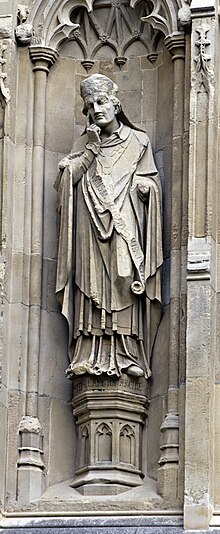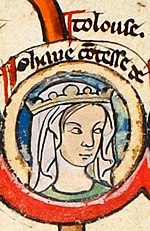Endgame, the song of John could only remain the same!
‘ The captains and the king, departed, their faces adorned with smiles!
These lasted but a few yards, not miles!’
‘King John would die in 1216, the following year!
But few if any would shed a tear!’
T’was but a false peace and the king and the rebellious barons both made preparations for the hostilities that all knew would come. In September a royal enemy, Robert Fitz Walter, had taken possession of the strategically vital Rochester castle with an ease that the king found almost degrading and which sent him into a state of veritable apoplexy.
In a mood of furious resolve he moved to take back the castle. After a long and bloody siege, John was able to recover both the castle and his peace of mind in late November. The king’s victory at Rochester gave huge momentum to his campaign, and greatly sapped the morale of the barons. By December 1215, John’s banner was in the ascendency and the rebels held London, but little else.
‘The New year of 1216 appeared to have good omens for the fortunes of the king!
However the year’s latter months would to him, deliver a terrible sting!’
Nonetheless, the rebels received welcome news from north of the border. The barons now had a new ally in the form of the new king of Scotland, sixteen year old Alexander.
‘The newly crowned King of Scots was but a mere boy!
But to the rebellious barons of England, he brought great joy!’
Alexander II King of Scotland.

The king of Scots marched into England to aid the barons, and John was determined to teach the boy monarch a lesson that he would never forget. The early months of 1216 witnessed a conflict that wrought great hardship on the unfortunate population as John travelled north, destroying so much in his wake.
John’s terrible war of attrition bore him great fruit, and he crossed the border ravaging southern Scotland with a savage meticulousness. The boy King of Scots had indeed been given a hard lesson in warcraft by the old king of England and it was one which John delivered with undisguised relish.
In the spring of 1216, John decided to turn southwards and quickly routed his enemies in eastern England. That done, it was time to lance the irritating boil that was London.
‘I will turn the rebellious rats out of their riverside nest!
This is a task that will be accomplished with aplomb and zest!
If you wish to join me or indeed oppose me, be my guest!’
Brave words, but sometimes actions fail to live up to statements of intent. Unfortunately for the king, his efforts to take London failed. John launched both a land, and seaborne assault, on the city but the rebels managed to repel the twin attacks. London held firm and the barons eagerly awaited the arrival of the Dauphin, Louis, son of King Philip ‘Deesgusting’ Augustus.
This was a disembarkation that John was determined to prevent. In fact, he hatched a plan to stop the embarkation of Louis, and keep him land bound in France. The king sent his navy to attack the French fleet whilst they were still anchored in various ports.
‘The English sailors sailed forth so noble and brave!
But all that awaited so many of them was a watery grave!’
However, luck was not with the royal mariners and the ocean faring enterprise ended in disaster. A huge storm destroyed many of the ships and those which survived were dispersed far and wide. The obstacle of the English navy now conveniently removed by the force of nature, Louis set sail for England, landing at Sandwich in May.
For some strange reason the advent of the Dauphin caused John to retreat from the east towards the west. The king declined to engage the French in combat. Louis then proceeded to march across the south-east unhindered by John, and soon secured both Canterbury and the much mentioned Rochester castle. By June, Louis was in possession of both London and Winchester. John’s kingdom appeared close to collapse and his supporters were deserting him and making peace with the Dauphin. John fled to Corfe castle and within its imposing walls he sat and cursed his chronic luck.
The king attempted a comeback against the Dauphin and the rebel barons and even tried to ambush King Alexander of Scotland who had come south to affirm his allegiance to Louis. John was enraged at the barefaced cheek of the boy and he swore to teach the Scottish teenager a permanent lesson.
‘I am appalled, Alex at your total lack of essential respect!
From me, no mercy can you reasonably expect!’
The old hound’s attempt to tan the young pup’s hide as he had done earlier in the year failed as the teenage monarch managed to elude his forces.
‘From his audience with Louis, Alexander went forth!
Riding happily back to his kingdom in the north!
The Scot flushed with pride having received the dauphin’s blessing!
As for King John, the chaos of recent events simply kept him guessing!’
In October whilst travelling through East Anglia, John was afflicted with dysentery. The king directed his entourage to make their way through the Wash in Lincolnshire. The Wash is a large bay, square in shape and is very shallow in certain places at low tide. It leads out to the North Sea. The royal train, complete with many valuables, set off along the shallow areas as this was a short-cut, or so it seemed. However the tide came in at a faster rate than the waggons could move, and many supplies including it is said, part of the Crown jewels, were swept away.
‘The incoming tide dealt the king a cruel blow!
But John’s earthly journey did not have long to go!’
The Wash.

John’s health continued to deteriorate as October progressed and he sought respite at Newark. He must have known that he was dying, and his physical discomfort was probably less painful than the knowledge that his nemesis King Philip ‘Deesgusting’ Augustus, would be overjoyed when he heard of his demise. Writhing in his death throes, John would be tormented by thoughts that the French king’s son and not his own son, the nine year old Henry, would become King of England. The mental anguish at this horrific prospect could only have hastened his death, which occurred on October 19th 1216.
King John was entombed in Worcester Cathedral.







































